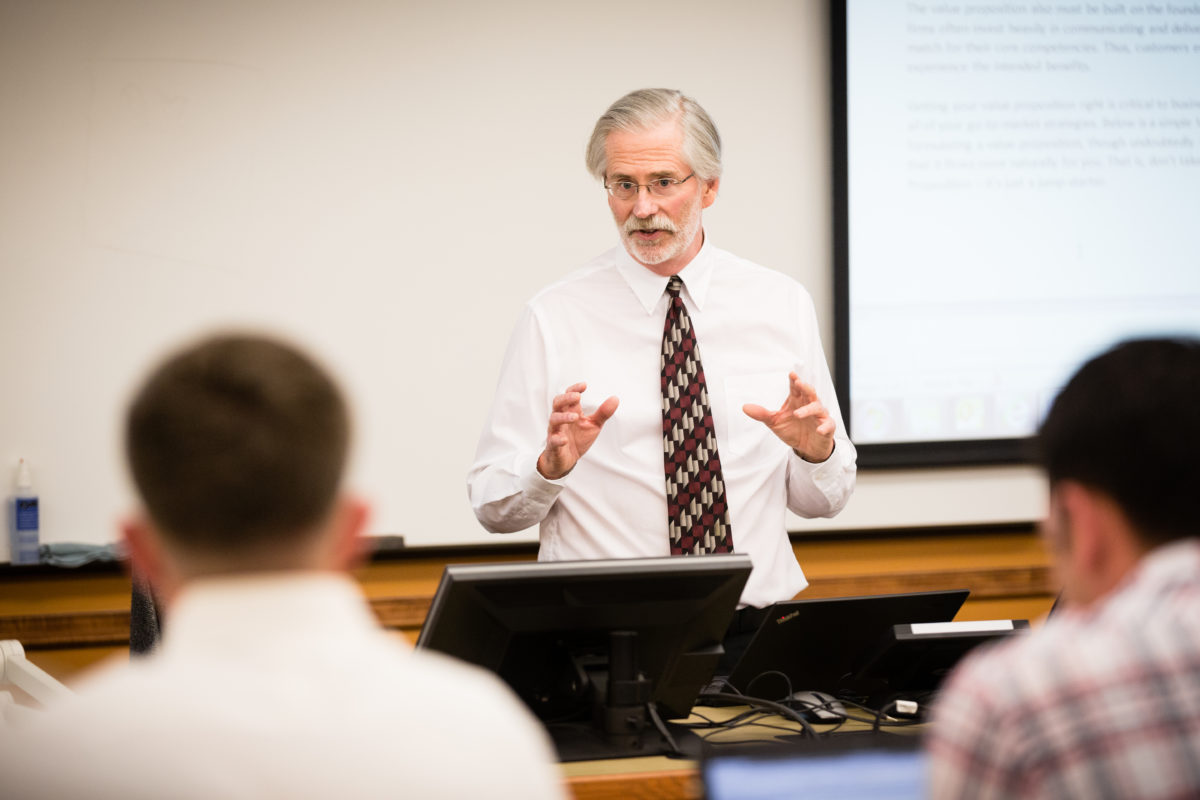FACULTY INSIGHT
It’s Time for Firms to Adjust to the Gig Economy Workforce, Says Dr. Marshall

Charles Harwood Professor of Marketing and Strategy Dr. Greg Marshall says the gig economy is already here and fields like marketing and sales will be the most affected.
If you have opened your phone, clicked on the Uber or Lyft app and hailed a ride, you too have participated in the gig economy. The same goes for when you outsource a project at work to a freelancer. Or sell a bottle of Rodan + Fields Active Hydration Serum to a friend.
According to Upwork’s Freelancing in America (FIA) report, 57.3 million Americans are already freelancing (36 percent of the workforce) and by 2027, a majority of the U.S. workforce will be freelancing in some aspect.
The comprehensive report of the U.S. independent workforce says freelancers contribute 1.4 trillion annually to the economy, and a majority of these gig economy workers are saying that they are working independently by choice.

By all accounts, the gig economy is thriving, and Crummer marketing expert Dr. Greg Marshall says marketing as a field will both be transformed by this and also contribute substantially to it in the future. Not only by how companies operate, but also by how companies market their products to consumers.
But what exactly is the gig economy in the first place? An authoritative source is the Gig Economy Data Hub, a collaborative project between the Aspen Institute’s Future of Work Initiative and Cornell University’s prestigious School of Industrial and Labor Relations. They suggest that, at its essence, a gig from an employment perspective quite simply consists of income-earning activities outside of traditional, long-term-employee relationships.
Dr. Marshall believes that as the shift towards a gig economy grows, the traditional approach of building an internal marketing team for a certain project may instead mean cherry-picking from a set of service-for-hire marketers who get deployed in laser-focused fashion to better match the right project team for the specific initiative. Is this the end of company marketing departments as we’ve known them for years? A valid question.
A New Book and a Global Event
To address this and many other unanswered questions, Dr. Marshall has recently signed on to co-edit a book for Emerald Publishing that is to be titled “Ultimate Gig” (note that the team has TM’d the phrase). The book will be the first of its kind and will lay out a shared vision for organizations and for current and future gig workers about what this new work-world paradigm really means. A who’s who of expert co-contributors from both academe and industry will be featured within this book, which he describes as a compendium on the topic.
In support of the concept and the project, Dr. Marshall will be a guest speaker at the 2019 World Marketing Summit in the United Kingdom in November. This event, which historically attracts arena-sized crowds as it moves from location to location around the world, is presented by an independent global organization of the same name that is led by Professor Philip Kotler – widely regarded as “the father of marketing.” The organization’s tagline is “Creating a better world through marketing,” and Professor Kotler will be delivering a major keynote address.
“I’m really grateful to be asked to be a part of this event,” said Dr. Marshall. This is Phil Kotler’s first major address in the UK in over ten years, so there’s no question the turnout will include everybody who’s anybody in marketing there – both practitioners and academics.
The Profile of a Gig Worker
Dr. Marshall first wants to address why the gig economy is becoming so popular, especially among millennials and generation Z.
First off, employee benefits like a 401k or healthcare plan that most traditional companies offer to their employees are not typically offered to gig workers, as by definition the employees are more nomadic in terms of who they are working for.
“Employee benefits are not really a part of the gig economy, and the folks who are gigging know that,” said Dr. Marshall. “They willingly trade-off some facets of work stability for benefits that mean a great deal to them: flexibility, freedom, and a different set of rewards. Their fathers and mothers probably don’t get it – that generation wanted the job status and the perks.”
Technology is the core driving force behind this movement, with 71% of freelancers saying remote work obtained online has increased for them over the past year, according to the FIA report.
For a marketer, the gig economy presents plenty of opportunities for work.
“Think anything digital, social,” said Dr. Marshall. “These are all skills in demand and they have a shortage on supply, especially quantitative marketers. There’s tremendous momentum in the marketplace for folks to gig around that possess those skills. There’s more work than people to do it, and the pay is outstanding.”
On the other side, companies need to start thinking more about how to market to professionals that are full-time freelancers.
“These people do not feel duty-bound to take on a traditional job as their one employment avenue,” said Dr. Marshall. “They are in better control of how they spend their activities on and off the job, which interestingly also opens them up differently as a consumer.”
He says companies can no longer hold the assumption that Monday thru Friday from 9 a.m. to 5 p.m. is when everyone is working, which needs to be taken into account in future marketing planning and consumer strategies.
Adjusting Gig-Marketers to Company Culture
Having somebody from the outside work on a project who is not totally aligned with your company’s mission, vision, and values immediately creates challenges.
One of the foremost problems of hiring gig economy workers is building a project team with freelancers and then trying to assimilate them into the company’s culture.

“You have got to think very carefully about who you’re hiring and what you want to outsource and what you want to have as an inside piece. If I’m a gig-employment company, if I’m someone really trying to get a lot of gig workers, I’m thinking about how I enculturate them into my environment,” said Dr. Marshall.
The academic research side of the relationship between company culture and the gig economy is minimal right now, but Dr. Marshall says it is definitely about to explode. For one thing, the University of Texas at Austin and the Direct Selling Education Foundation are partnering to hold the first-ever research forum dedicated to this and other nouveau topics. Dr. Marshall and a UT professor are co-leading the event and attendees will be both research academics and industry executives. The goal is to identify a robust future research agenda for the field.
“You have to wonder how all this impacts organizational culture towards the customer because a lot of that customer-centric culture does come from folks who would be the marketing people,” said Dr. Marshall.
Under things that can be controlled by companies, when hiring gig workers, style guides and preparatory phone calls briefing the worker on the company’s culture can be helpful.
Also, keeping institutional knowledge in-house is important if there is a revolving door of gig workers flowing through the organization.
As to the Future…
“I really think it’s the best time, at least in my career, to be in marketing. With these sea changes we’ve identified, more organizations are tending to outsource marketing. Instead of being the one or two persons working in marketing in your organization on a salary, a lot more organizations are turning to specialized verticals that are purely designed to do the marketing for them,” said Dr. Marshall. It’s slightly like the old advertising agency model, but much broader in scope and impact to the firm and the consumer marketplace.
Going forward, gig workers are in a great position to be picky about choosing their opportunities for income-earning activities. “It’s a seller’s market, and prospects must perceive that a firm’s work opportunity provides an overall attractive bundle of benefits in order to attract the best prospects for gig work,” Dr. Marshall says.
There’s no question that individuals who are prospects for gig work compare opportunities across industries and types of jobs. So, a firm must offer a strong value proposition for gig workers, when compared with other choices they have for their precious and limited income-earning hours. This will go a long way toward ensuring success in this very competitive talent environment.

